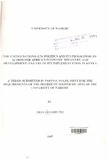| dc.description.abstract | This thesis is a study of the United Nations Programme of Action for Africa's Economic Recovery and Development, 1986-90. Its major interest is to probe the factors which may help to explain the apparent failure of the United Nations Programme for Africa's Economic Recovery and Development in Kenya as a case study.
An attempt has been made to probe the link between the United Nations politics
and the organization'S inadequate resources including lack of political will (on the part of its member states), on the one hand, andjhe'jailure in Kenya of the
United Nations Programme of Action for Africa's Economic Recovery and Development, on the other. Thus, the study surveys the struggle for control and survival among the United Nations member states as a guide to explicating the failure of this programme. This exercise has inevitably' entailed an evaluation of the concepts of "power" and the" national interest" in so far as they are factors both in the dynamics of the United Nations politics and the implementation of its programmes. in our case the Programme of Action for Africa' s Economic
Recovery and Development.
Against this background, this study examines in great detail. the practicality of the United Nations as a world government scheme for the management of world affairs in view of the failure of its Programme of Action for Africa's Economic Recovery and Development in Kenya. In tandem with this concern. the study attempts to validate or invalidate arguments against "a world government" which often focus on the threat it may pose to the cherished political values of power
and the national interest of states in world politics.
The study begins by postulating that the United Nations Programme of Action for
Africa's Economic Recovery and Development was necessitated by the African
.
crisis and the continent's struggle for survival; and that the programme I s failure
was largely a consequence of the donor states' struggle to tighten their grip on the control and preservation of world resources including power, on the one hand,
and Africa's lack of resources and political will. on the other.
The f rst chapter of the thesis therefore, deals with the statement of the problem under investigation which generates some hypotheses that could explain the problem. In this chapter. we have not only discussed the methodology of the research and the justification of the study, but the part also discusses a theoretical
framework within which our study falls. A review of literature available on the
subject under discussion has also been done with a view to identifying the gap our study intends to fill.
The next part of the thesis (Chapters Two, Three and Four) deals with historical facts about the UN as an organization and empirical evidence of the operation of the United Nations using the Programme of Action for Africa's Economic
Recovery and Development as a case study.
The last part of the thesis (chapter Five) deals with summary of findings,
conclusions, and recommendations of urgent reforms in the mission statement and
structure of the United Nations for it to acquire and retain [he cutting edge in the new world order. Our major recommendation is that the UN charter should be reviewed in order to embrace the dynamics of international affairs and perhaps enable the organization cope with these dynamics. | en |

